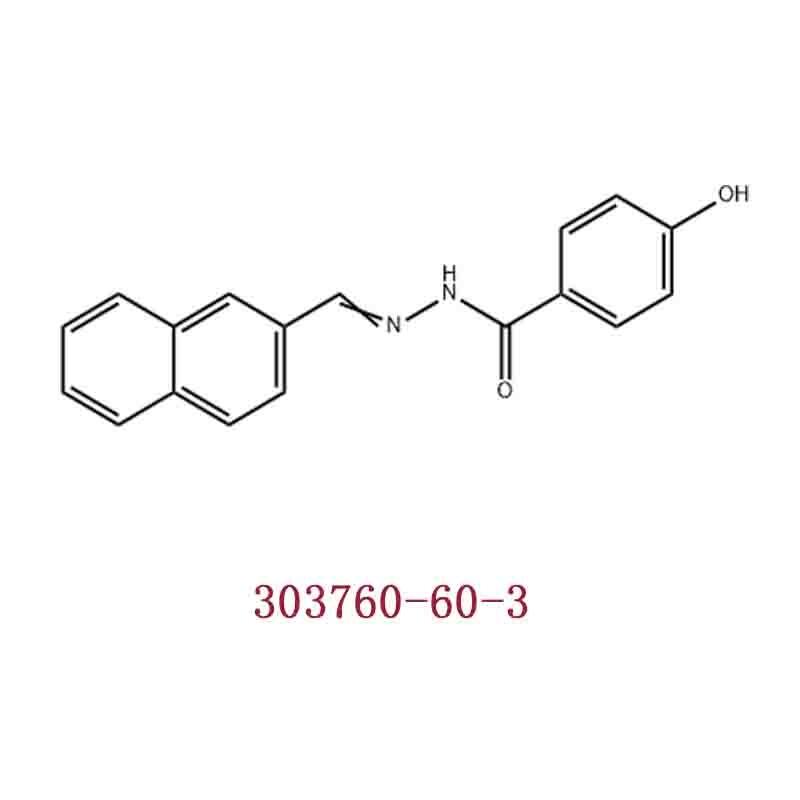-
Categories
-
Pharmaceutical Intermediates
-
Active Pharmaceutical Ingredients
-
Food Additives
- Industrial Coatings
- Agrochemicals
- Dyes and Pigments
- Surfactant
- Flavors and Fragrances
- Chemical Reagents
- Catalyst and Auxiliary
- Natural Products
- Inorganic Chemistry
-
Organic Chemistry
-
Biochemical Engineering
- Analytical Chemistry
-
Cosmetic Ingredient
- Water Treatment Chemical
-
Pharmaceutical Intermediates
Promotion
ECHEMI Mall
Wholesale
Weekly Price
Exhibition
News
-
Trade Service
*For medical professionals only
For the treatment of colorectal cancer (CRC), early surgical resection is still the only treatment that is now likely to reach a cure level, but about 25% of patients have metastasized at the time of initial diagnosis [1], essentially losing the opportunity for
surgery.
With the continuous innovation and breakthrough of targeted drugs in the treatment of malignant tumors and the advancement of standardized treatment, the overall survival (OS) of patients with advanced CRC has been gradually extended
.
According to statistics, between 2003 and 2015, the 5-year survival rate of CRC patients in China increased by nearly 10%[2].
The new post-line treatment model has brought obvious survival benefits to CRC patients, and even entered the "era of chronic diseases"
.
Among them, anti-angiogenic drugs play a crucial role
in post-line therapy of advanced CRC.
In order to enable more patients with metastatic colorectal cancer (mCRC) to obtain the best survival benefits in treatment, it
is imperative to implement a more standardized bowel cancer diagnosis and treatment plan, build a full-scale treatment management model for bowel cancer, and balance the treatment differences between different regions.
To this end, the Colorectal Cancer Committee of the Chinese Society of Clinical Oncology and Huang Pharmaceutical jointly held the 2022 "Excellent YOUNG Good Medical Voice - Speech on the Whole Process Management of Advanced Colorectal Cancer"
.
During this period, a large number of practical diagnosis and treatment cases emerged across the country, and many front-line clinicians presented us with wonderful case sharing
.
In this issue, we have selected a successful case
of effective whole-process management of CRC multiple liver metastasis patients from Dr.
Su Wanzhan Yu Hanqing.
▌ Diagnosis and treatment
▌ Diagnosis of adenocarcinoma at the
direct B junction with multiple metastases of the liver (stage IV), KRAS, NRAS, BRAF are all wild type, MSS;
First-line treatment (May 20, 2020 – April 19, 2021)
First MDT discussion: assessment of the primary lesion without indications of emergency surgery, while liver metastases are unresectable and there are no indications for radical surgical resection; Systemic anti-tumor therapy is carried out first, and the possibility of local treatment is assessed at a later stage;
Treatment plan: according to the "2020 CSCO Colorectal Cancer Diagnosis and Treatment Guidelines", cetuximab + CapeOx chemotherapy for 8 cycles;
Efficacy assessment: re-examination CT on January 6, 2021 showed that multiple metastases in the liver were reduced compared with the previous one, and partial relief (PR);
Second MDT discussion: liver metastases are reduced compared to the previous ones, but radical resection, radiotherapy, or ablation therapy remain difficult; No obvious symptoms of rectal lesions, with extensive hepatic metastases, limited benefit from local rectal surgery; Systemic anti-tumor therapy is effective, continue to use systemic anti-tumor therapy;
Treatment options: cetuximab + capecitabine maintenance for 3 cycles;
Efficacy assessment: re-examination CT on April 19, 2021 showed that multiple metastases in the liver were enlarged compared with before, and tumor markers were significantly elevated, indicating disease progression (PD);
Figure 1 First-line treatment CT vs.
second-line therapy (April 20, 2021 to July 27, 2021)
treatment evaluation: first-line RAS and BRAF wild type who have received oxaliplatin chemotherapy;
Treatment plan: according to the "2020 CSCO Colorectal Cancer Diagnosis and Treatment Guidelines", bevacizumab + FOLFIRI (irinotecan + leucovorin + fluorouracil) regimen for 4 cycles;
Efficacy assessment: multiple metastases in the liver are enlarged again than before, and new lesions appear; Tumor markers are significantly elevated, and the efficacy is evaluated PD;
Figure 2 Second-line treatment CT vs.
third-line therapy (July 27, 2021 - case reporting cut-off time)
treatment evaluation: second-line treatment has received MSS, RAS and BRAF wild type patients with oxaliplatin and irinotecan, and the CPS score of the patient is <1 point, PD-L1 (-); <b117>Treatment plan: according to the "2020 Colorectal Cancer CSCO Diagnosis and Treatment Guidelines" recommended, fruquintinib 5mg/4mg targeted therapy;
Adverse reactions: moderate asthenia; Mild elevation of aminotransferases; Secondary hand-foot skin reactions; Overall tolerable efficacy
assessment: multiple metastases in the liver are slightly reduced compared to July 27, 2021; Tumor markers are lower than before, suggesting disease stabilization (SD); Overall controllable adverse reactions;
Figure 3 Third-line treatment CT comparison chart
expert review instructor: Professor Ma Tai of
the First Affiliated Hospital of Anhui Medical University commented on the expert: Professor Han Gaohua of Taizhou People's Hospital Professor Ma Tai mentioned in the case summary: For the treatment process of the patient, the overall benefit is undoubtedly based on the standardized management of the whole course of
the disease 。 Two MDT discussions were conducted at the first-line treatment to assess the overall and local condition of the patient: the patient's primary lesion was unindicated and the liver metastases could not be resected, and systemic antitumor therapy was performed with cetuximab + CapeOx chemotherapy after the first MDT discussion, and the efficacy was evaluated as PR
.
The second MDT evaluation found that the patient still did not benefit from topical therapy, and continued maintenance therapy with the original regimen until the patient's tumor progressed
.
In the first-line treatment, the abdominal pain and blood in the stool accompanied by the primary focus of the patient were significantly reduced compared with the previous treatment, and the patient's quality of life was taken into account while controlling tumor progression, and a progression-free survival (PFS)
of 12 months was obtained.
In the subsequent second-line treatment, it is regrettable that the patient only received PFS
for 3 months.
According to the recommendations of the 2021 CSCO Colorectal Cancer Diagnosis and Treatment Guidelines, the final third-line treatment selected fruquintinib monotherapy for the patient, and the overall efficacy was evaluated SD
.
For the third-line treatment of this patient, Professor Han Gaohua commented that based on the results of the subgroup of liver metastases in the FRESCO study, the median OS of fruquintinib was significantly longer than that of placebo (8.
61 months vs 5.
98 months, HR=0.
59, P<0.
001), and the median PFS was also significantly improved (3.
71 months vs 1.
84 months, HR=0.
22, P<0.
001).
<b131> In terms of safety, there was no significant difference in hepatotoxicity in the fruquintinib group compared with the placebo group even in patients with liver metastases[3
].
The patient has multiple metastases of the liver, and it is necessary to control the progression of liver lesions and ensure the safety
of the drug during third-line treatment.
Patients treated with fruquintinib monotherapy, with efficacy assessed as SD and mild adverse effects, once again confirmed that fruquintinib is excellent and safe
in patients with CRC with liver metastases.
Case EssentialsThis case is a rectal cancer patient with extensive liver metastases who was first diagnosed, and throughout the course of treatment, the next treatment plan
is adjusted around whether the liver lesion is effectively controlled.
Treatment decisions
are made on a patient basis based on guidelines recommended by the guidelines and discussed after MDT.
In terms of third-line drug selection, the results of FRESCO Hybrid can also be seen that fruquintinib has better PFS than other tyrosine kinase inhibitor (TKI) drugs in the post-line treatment of CRC in China[4].
Fruquintinib, as the preferred choice for patients with liver metastases, has brought 13 months of PFS to patients in third-line monotherapy and continues to benefit
from the combination of safety and tolerability.
The whole diagnosis and treatment process reflects the standardization and whole-process management of the case, and is undoubtedly an excellent guarantee
for the patient's survival benefits.
Figure 4 Schematic diagram of the patient's disease course
In patients with multiple liver metastases in coloral cancer, fruquintinib alone has significant benefit
.
For the treatment of colorectal cancer (CRC), early surgical resection is still the only treatment that is now likely to reach a cure level, but about 25% of patients have metastasized at the time of initial diagnosis [1], essentially losing the opportunity for
surgery.
With the continuous innovation and breakthrough of targeted drugs in the treatment of malignant tumors and the advancement of standardized treatment, the overall survival (OS) of patients with advanced CRC has been gradually extended
.
According to statistics, between 2003 and 2015, the 5-year survival rate of CRC patients in China increased by nearly 10%[2].
The new post-line treatment model has brought obvious survival benefits to CRC patients, and even entered the "era of chronic diseases"
.
Among them, anti-angiogenic drugs play a crucial role
in post-line therapy of advanced CRC.
In order to enable more patients with metastatic colorectal cancer (mCRC) to obtain the best survival benefits in treatment, it
is imperative to implement a more standardized bowel cancer diagnosis and treatment plan, build a full-scale treatment management model for bowel cancer, and balance the treatment differences between different regions.
To this end, the Colorectal Cancer Committee of the Chinese Society of Clinical Oncology and Huang Pharmaceutical jointly held the 2022 "Excellent YOUNG Good Medical Voice - Speech on the Whole Process Management of Advanced Colorectal Cancer"
.
During this period, a large number of practical diagnosis and treatment cases emerged across the country, and many front-line clinicians presented us with wonderful case sharing
.
In this issue, we have selected a successful case
of effective whole-process management of CRC multiple liver metastasis patients from Dr.
Su Wanzhan Yu Hanqing.
Case review
- male patient, 58 years;
- Current medical history: On April 16, 2020, the patient developed "dysfesis, accompanied by blood in the stool", and the pathological tip of the colonoscopy of the outer hospital was adenocarcinoma at the junction of the rectum and sigmoid colon;
- Previous physical fitness, personal history, family history is not special;
- CT prompt: multiple low-density foci of the liver, considering metastasis (visited our hospital on April 24, 2020);
▌ Diagnosis and treatment
- On April 25, 2020, after performing the CapeOx (Oxaliplatin + capetabine) program chemotherapy 1 course of surgery in our hospital, I lacked surgical indications and was transferred to our department for continued treatment;
- Laboratory test tips: CEA: 387.
2 ng/mL; CA72-4:19.
16U/ml; CA19-9:622.
7U/ml; - CT indications: thickening of the wall of the tube at the straight B junction with enlargement of the surrounding lymph nodes; Multiple low-density foci in the liver (May 18, 2020);
- Genetic testing tips: KRAS, NRAS, BRAF wild type, MSS;
- ECOG: 1 point
▌ Diagnosis of adenocarcinoma at the
direct B junction with multiple metastases of the liver (stage IV), KRAS, NRAS, BRAF are all wild type, MSS;
First-line treatment (May 20, 2020 – April 19, 2021)
First MDT discussion: assessment of the primary lesion without indications of emergency surgery, while liver metastases are unresectable and there are no indications for radical surgical resection; Systemic anti-tumor therapy is carried out first, and the possibility of local treatment is assessed at a later stage;
Treatment plan: according to the "2020 CSCO Colorectal Cancer Diagnosis and Treatment Guidelines", cetuximab + CapeOx chemotherapy for 8 cycles;
Efficacy assessment: re-examination CT on January 6, 2021 showed that multiple metastases in the liver were reduced compared with the previous one, and partial relief (PR);
Second MDT discussion: liver metastases are reduced compared to the previous ones, but radical resection, radiotherapy, or ablation therapy remain difficult; No obvious symptoms of rectal lesions, with extensive hepatic metastases, limited benefit from local rectal surgery; Systemic anti-tumor therapy is effective, continue to use systemic anti-tumor therapy;
Treatment options: cetuximab + capecitabine maintenance for 3 cycles;
Efficacy assessment: re-examination CT on April 19, 2021 showed that multiple metastases in the liver were enlarged compared with before, and tumor markers were significantly elevated, indicating disease progression (PD);
Figure 1 First-line treatment CT vs.
second-line therapy (April 20, 2021 to July 27, 2021)
treatment evaluation: first-line RAS and BRAF wild type who have received oxaliplatin chemotherapy;
Treatment plan: according to the "2020 CSCO Colorectal Cancer Diagnosis and Treatment Guidelines", bevacizumab + FOLFIRI (irinotecan + leucovorin + fluorouracil) regimen for 4 cycles;
Efficacy assessment: multiple metastases in the liver are enlarged again than before, and new lesions appear; Tumor markers are significantly elevated, and the efficacy is evaluated PD;
Figure 2 Second-line treatment CT vs.
third-line therapy (July 27, 2021 - case reporting cut-off time)
treatment evaluation: second-line treatment has received MSS, RAS and BRAF wild type patients with oxaliplatin and irinotecan, and the CPS score of the patient is <1 point, PD-L1 (-); <b117>Treatment plan: according to the "2020 Colorectal Cancer CSCO Diagnosis and Treatment Guidelines" recommended, fruquintinib 5mg/4mg targeted therapy;
Adverse reactions: moderate asthenia; Mild elevation of aminotransferases; Secondary hand-foot skin reactions; Overall tolerable efficacy
assessment: multiple metastases in the liver are slightly reduced compared to July 27, 2021; Tumor markers are lower than before, suggesting disease stabilization (SD); Overall controllable adverse reactions;
Figure 3 Third-line treatment CT comparison chart
expert review instructor: Professor Ma Tai of
the First Affiliated Hospital of Anhui Medical University commented on the expert: Professor Han Gaohua of Taizhou People's Hospital Professor Ma Tai mentioned in the case summary: For the treatment process of the patient, the overall benefit is undoubtedly based on the standardized management of the whole course of
the disease 。 Two MDT discussions were conducted at the first-line treatment to assess the overall and local condition of the patient: the patient's primary lesion was unindicated and the liver metastases could not be resected, and systemic antitumor therapy was performed with cetuximab + CapeOx chemotherapy after the first MDT discussion, and the efficacy was evaluated as PR
.
The second MDT evaluation found that the patient still did not benefit from topical therapy, and continued maintenance therapy with the original regimen until the patient's tumor progressed
.
In the first-line treatment, the abdominal pain and blood in the stool accompanied by the primary focus of the patient were significantly reduced compared with the previous treatment, and the patient's quality of life was taken into account while controlling tumor progression, and a progression-free survival (PFS)
of 12 months was obtained.
In the subsequent second-line treatment, it is regrettable that the patient only received PFS
for 3 months.
According to the recommendations of the 2021 CSCO Colorectal Cancer Diagnosis and Treatment Guidelines, the final third-line treatment selected fruquintinib monotherapy for the patient, and the overall efficacy was evaluated SD
.
For the third-line treatment of this patient, Professor Han Gaohua commented that based on the results of the subgroup of liver metastases in the FRESCO study, the median OS of fruquintinib was significantly longer than that of placebo (8.
61 months vs 5.
98 months, HR=0.
59, P<0.
001), and the median PFS was also significantly improved (3.
71 months vs 1.
84 months, HR=0.
22, P<0.
001).
<b131> In terms of safety, there was no significant difference in hepatotoxicity in the fruquintinib group compared with the placebo group even in patients with liver metastases[3
].
The patient has multiple metastases of the liver, and it is necessary to control the progression of liver lesions and ensure the safety
of the drug during third-line treatment.
Patients treated with fruquintinib monotherapy, with efficacy assessed as SD and mild adverse effects, once again confirmed that fruquintinib is excellent and safe
in patients with CRC with liver metastases.
Case EssentialsThis case is a rectal cancer patient with extensive liver metastases who was first diagnosed, and throughout the course of treatment, the next treatment plan
is adjusted around whether the liver lesion is effectively controlled.
Treatment decisions
are made on a patient basis based on guidelines recommended by the guidelines and discussed after MDT.
In terms of third-line drug selection, the results of FRESCO Hybrid can also be seen that fruquintinib has better PFS than other tyrosine kinase inhibitor (TKI) drugs in the post-line treatment of CRC in China[4].
Fruquintinib, as the preferred choice for patients with liver metastases, has brought 13 months of PFS to patients in third-line monotherapy and continues to benefit
from the combination of safety and tolerability.
The whole diagnosis and treatment process reflects the standardization and whole-process management of the case, and is undoubtedly an excellent guarantee
for the patient's survival benefits.
Figure 4 Schematic diagram of the patient's disease course
References:
[1] Gastrointestinal Surgery Group of Surgery Branch of Chinese Medical Association, Colorectal Surgery Group of Surgery Branch of Chinese Medical Association, Colorectal Cancer Professional Committee of Chinese Anti-Cancer Association, etc.
Chinese Guidelines for the Diagnosis and Comprehensive Treatment of Colorectal Cancer Liver Metastases (2018 Edition)[J].
Chinese Journal of Digestive Surgery,2018,17(6):527-539.
[2] Zeng H,Chen W,Zheng R,et al.
Changing cancer survival in China during 2003-15:a pooled analysis of 17 population-based cancer registries.
Lancet Glob Health.
2018 May; 6(5):e555-e567.
[3] Qin S,Xu RH,Shen L,et al.
Subgroup Analysis by Liver Metastasis in the FRESCO Trial Comparing Fruquintinib versus Placebo Plus Best Supportive Care in Chinese Patients with Metastatic Colorectal Cancer.
Onco Targets Ther.
2021; 14:4439-4450.
[4] FRESCO Hybrid:A multi-center effectiveness comparison study of fruquintinib with constructed external control cohort of other TKIs using real-world data in 3+line treatment of metastatic colorectal cancer.







